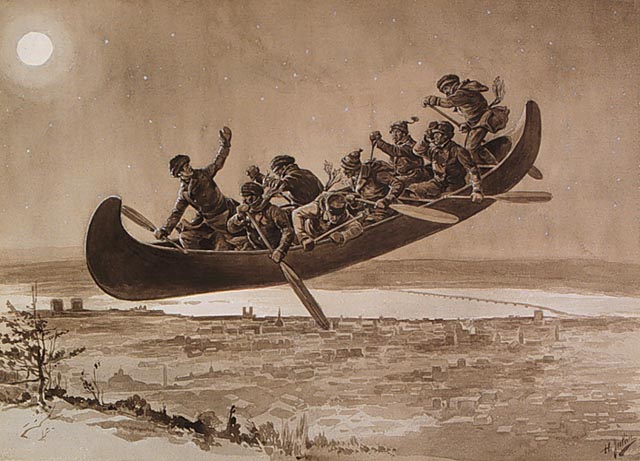Today’s tale, a French Canadian folktale, takes place on New Year’s Day long ago in Quebec. According to the legend, a group of lumberjacks was deep in the middle of a forest, felling huge trees and working hard day after day. They are lonely, though, missing their wives and girlfriends.
On this particular New Year’s Day, it was snowing so hard and the wind was blowing so fiercely that the lumberjacks could not work, so they were all huddled in the camp, wishing they could go home for the day. Baptiste finally stated what they were all thinking, “I wish to go home today and see my girl!” One of the others, Jean, agreed but protested that the weather was too bad. Baptiste responded that they could take his canoe. Baptiste, you see, had made a deal with the devil to run a chasse-galerie, a flying canoe. The devil would make the canoe fly wherever Baptiste wanted, as long as Baptiste did not say the mass for a year. Baptiste had to return the canoe by daybreak or the devil would keep his soul. In addition, as part of the pact, Baptiste and his companions must not blaspheme during the voyage or touch crosses atop church steeples or the canoe would crash.
It takes some convincing, but Baptiste and seven of the other men make the trip. Their women were thrilled to see them, and they all danced and drank and partied late into the night. When it was close to dawn, the men realized they need to get the canoe back to the camp or they would lose their souls. After searching for Baptiste, they found him passed out under a table at the tavern. They bundled him up and threw him into the canoe and took off for the forest. They tied and gagged Baptiste, worried that if he woke up he might speak the name of God at an inopportune moment and they would all crash.
Baptiste does awaken. He manges to loosen the gag and shouts, “Mon Dieu, why have you tied me up?” At the name of God, the canoe immediately plunges from the sky, hitting a tall pine and dumping all the men into the darkness. None of them were seen again.
I found an interesting tidbit about this story on Wikipedia. Apparently, this story can be traced back to a French legend about a rich nobleman named Gallery who loved to hunt. He loved it so much that he refused to attend Sunday mass. As punishment for this sin he was condemned to fly forever through the night skies, chased by galloping horses and howling wolves, in a fashion reminiscent of the Wild Hunt, which is a European tale with various versions. Fundamentally, it is a spectral group of huntsmen with the accoutrements of hunting, with horses and hounds in mad pursuit across the skies or along the ground, or just above it. The hunters are often the dead or fairies or a legendary figure like Woden. When French settlers arrived in Canada, they swapped stories with the natives and the tale of Gallery was combined with an Indian legend about a flying canoe. That’s one of the reasons I love fairy tales and folk stories. They are not static. They evolve and change. They reflect life and death, the cultures they come from and how those cultures interplay.
You can read the story on-line several places or watch the short film from the National Film Board of Canada, “The Legend of the Flying Canoe (La Chasse-galerie)” directed by Robert Doucet.
Thursday’s Tales is a weekly event here at Carol’s Notebook. Fairy tales, folktales, tall tales, even re-tellings, I love them all.


Sounds like a good book. THANKS for the post.
Elizabeth
Silver’s Reviews
My Blog
Cool 😀 I do like that they change and remain great